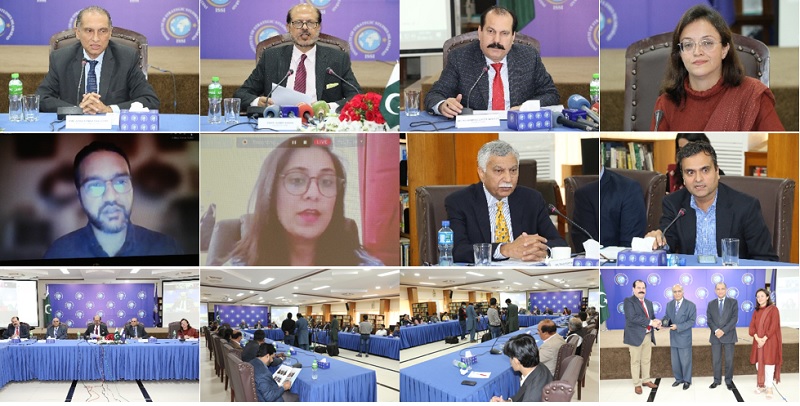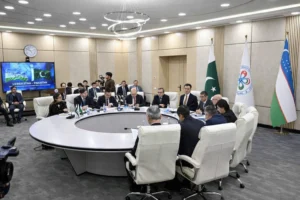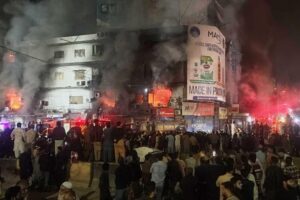Managing Natural Disasters in Pakistan

Islamabad, The Gulf Observer: The Centre for Strategic Perspectives (CSP) at the Institute of Strategic Studies Islamabad (ISSI) in collaboration with Islamabad Security Dialogue (ISD) organised a Panel Discussion titled, “Managing Natural Disasters in Pakistan” .
Speakers of the event included: Mr. Idrees Mahsud, Member (Disaster Risk Reduction), National Disaster Management Authority (NDMA) Pakistan; Engr. Aamir Hasan, Secretary, National Security Division (NSD); Mr. Raja Rehan Arshad, Former Lead Disaster Risk Management Specialist, World Bank; Dr. Imran Khalid, Director, Governance and Policy, WWF; Ms. Maryam Shabbir Abbasi, Visiting Senior Research Associate, SDPI; and Mr. Ammar Rashid, Senior Researcher, Heartfile.
In her introductory remarks Dr Neelum Nigar, Director, CSP said that the discussion was aimed at shedding light on factors leading to the occurrence of hazards and the existing challenges with regards to Pakistan’s preparedness in preventing and mitigating their impact.In his welcome remarks, Ambassador Aizaz Ahmad Chaudhry, Director General, ISSI, said that Pakistan is facing unprecedented floods and whether it is a recurring phenomenon or an exceptional situation still needs to be determined. Going forward, Pakistan needs to implement the lessons learnt from previous disasters formulate and executive policies accordingly.
Aamir Hasan said that in the last decade Pakistan has faced major natural disasters in the form of floods leading to a humanitarian crisis in the country. Pakistan is facing unprecedented challenges due to climate change and the country is not prepared to deal with these challenges. The natural disaster has also increased economic challenges along with food insecurity in the country.Mr. Mahsud, Member NDMA said that moving forward Pakistan needs to develop policies to make it more resilient to natural disasters.
Disaster Management is an evolved subject and NDMA 2010 Act was an important legislation in this regard. There is a need to strengthen coordination at the provincial and district levels. He added that Pakistan has national frameworks in place but what is lacking is their implementation.
Risk assessment needs to be carried out across Pakistan to determine the vulnerable areas and actions should be taken accordingly.He further said that Pakistan policy circles are more sensitised to take actions more efficiently after learning hard lessons from the previous natural disasters. Pakistan cannot reduce its risk completely but it can prepare for mitigation and adaptation.
Resolving endemic issues along with climate disaster management is also vital and for that there is a need to keep the discussion active on this topic at the national level.During the panel discussion, Mr. Rashid said that PDMAs are still non-functional and district level coordination is missing. Furthermore, funding for disaster management has not increased in accordance with the losses incurred.
Pakistan is also not utilising existing institutional capacity and end up creating new institutions after every disaster leading to decrease in institutional learning. He further emphasised that essential sectors like health, education, and agriculture need to be prioritised during reconstruction phase.
Along with these, institutional roles need to be defined so that they can work efficiently which can be achieved through capacity building.While sharing her views on the subject, Ms. Abbasi said that data and knowledge-based response is required for Pakistan to deal with disasters. Pakistan needs to strengthen its own constitutional rather than looking for handouts.
Mental health arising out of disaster is also an important subject that needs to be looked into as it is a real thing. Furthermore, gender issues also need to be managed during disaster mitigation. Furthermore, aid coming into the country needs to reach the vulnerable people to ensure their social protection. Mr. Arshad said that 2022 floods are a wakeup call for Pakistan as disaster is a multi-layered calamity.
Natural hazards should not be looked as a major threat but there needs to be a holistic approach. Policy, financing, implementation, regulatory institutions need to be looked into together as a collective. He emphasised that scenario analysis and risk identification should be done at national and regional level.
Contingent funds need to be set up for disasters so that country does not have to repurpose development funds and look for international financing.Dr. Imran Khalid, while presenting his views said that climate change is not a major issue, rather lack of good governance is an issue in Pakistan. He further said that global warming targets are out of reach especially for vulnerable countries like Pakistan which impact it adversely. COP-27 will not be able to produce desired results as the developed world is not fulfilling its commitments. Moreover, policy and plans need to build on previous plans, but this is lacking in Pakistan. Disaster response needs to be taken seriously as inaction impacts the national security of Pakistan.


